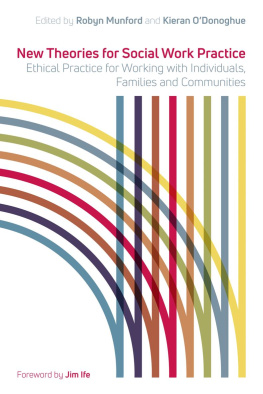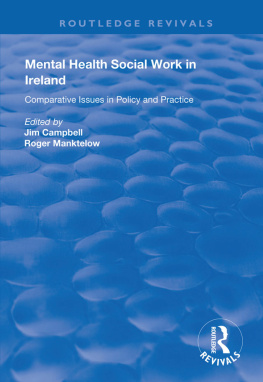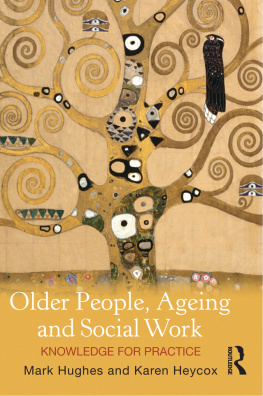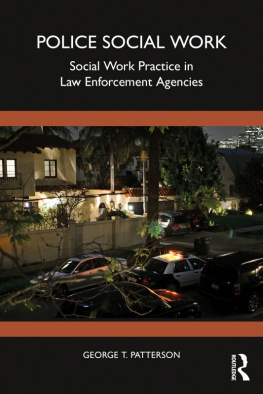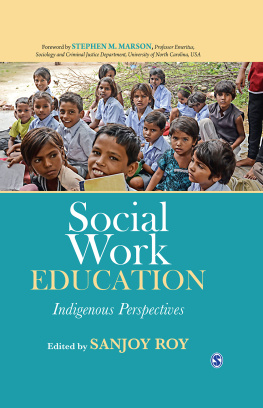Foreword
JIM IFE
We are living at a time of significant change.
Multiple crises ecological, economic, social and political loom in the near future, and in some measure they are already part of our experience. Climate change is real and is affecting peoples lives in many nations. Globalization and neoliberal ideology have together created a global economy that is both inequitable and unsustainable. We are reaching, and indeed have overshot, the ecological limits to growth, with devastating consequences not only for humans but also for the non-human world. There is a growing global realization that we cannot go on as we have been, and that in confronting the future the one thing of which we can be sure is that it will not be a simple continuation of the present, even though alternative futures are still hard for many people to imagine.
In such a world of uncertainty, how should social workers practise? Given the vulnerabilities of many already disadvantaged groups, the increasing precarity of peoples lives, and the obscene levels of inequality we now see globally and nationally, it would seem that social workers are going to be more needed than ever in the coming decades. The principles of social justice and human rights, and the emphasis on relationships, that are foundational for social work, will be very important in this period of crisis and change. But the organizational structures in which social workers can practise, and the forms that this practice might take, are far from clear. It is in that context that this book makes an important contribution.
In adapting to a new and uncertain future, there is a temptation to discard the old and start again. This, for social work, would be a serious mistake. While the future will undoubtedly throw up new challenges and require new ways of practising, it is also true that social workers have developed considerable experience in working for social justice, and in strengthening relationships at all levels: family, community and society. This experience will be important in shaping a future for social work, and social workers can and should use their expertise in both theory and practice as a basis for future and evolving forms of alternative social work. Indeed, it can be argued that social work skills, theory and values have much to contribute to the wider society. One common theme among many writers concerned with ecological or economic crisis is the importance of community; if there is to be a way forward for humanity, it will require strong, resilient and sustainable communities, and in this regard social workers have much to contribute. Social workers cannot afford to be apologetic about their professional knowledge and skills, but rather should recognize that they have expertise that others are looking for, and that social work can play a pivotal role at this historic moment. The chapters in this book provide a strong basis for building the newly emerging social work. They recognize the importance of existing social work knowledge and practice wisdom, and show how the new social work can emerge from the best of the old.
The continuing erosion of the commons whether in terms of land, public space, education, intellectual property, human services or cultural practices is reinforced by the politics and economics of neoliberalism, where everything possible is commodified and placed in private ownership, to be used for private profit rather than human flourishing. The impact of this on human (and indeed non-human) community is serious, and it is important for social workers to find ways to push back against continuing neoliberal commodification and to emphasize the importance of relationships and of community as what give meaning and significance to life. This emphasis on relationship, and relational reality, is central to social work practice, and this is reflected in many of the chapters of this book. The strong community traditions of Aotearoa New Zealand, evident to many visitors to that country, and central to the way social work has been conceptualized there, represent a particularly strong focus for future social work, and here Aotearoa New Zealand has much to teach the rest of the world about community-based social work.
The centrality of service recipients or communities is another major theme of this book. In an era so dominated by Western modernity, with its top-down traditions and its embrace of managerialism, this is indeed a radical position. Social workers are well aware of the inadequacy of many programmes designed by academics, managers or political leaders, and imposed on families or communities who have little or no say in the matter. Such practice both disempowers those we would rather be seeking to empower, and also further alienates them from the very structures and institutions that are supposedly designed to help . The importance of people actually having significant agency in determining the nature of the services they need, and being able to articulate their own hopes and aspirations rather than these being assumed by well-meaning bureaucrats or managers, has been consistently advocated by social workers in many different settings, and is another strong theme of the chapters in this book. In this way, social workers can join, and indeed lead, the challenge against the top-down thinking that has been so characteristic of many approaches to intervention (a word that social workers should use only with extreme caution).
Increasing ecological awareness has underlined the importance of the principle of diversity. Whether in agricultural, biological or human fields, diversity is more sustainable, and indeed necessary for life and for communities to thrive. Modernity has bred an obsession with similarity or uniformity, often motivated by a limited view of effectiveness or efficiency. It may be easier to deal with or manage a community of sameness rather than a community of difference, but it is from communities of difference that people can flourish. Rather than the traditional labour saying of in unity is strength , the ecological principle is in diversity is strength. The value of diversity is now recognized across many different fields, from agriculture to genetics to microbes to cultures, to human communities.
This principle applies also to social work. Diversity is central to good social work practice, and social workers have considerable experience in promoting diversity as a positive to be supported, rather than as a problem to be managed. The emphasis on diversity in many of the chapters of this book is again an indication that the book is dealing with emerging issues that are central to social work practice. Diversity is seen as a problem rather than a strength in many societies, leading to xenophobia, racism and a reluctance to support programmes of multiculturalism. It is shown particularly in attitudes to refugees and asylum seekers. At this time, social works commitment to diversity is of particular relevance, and should be a strong point of advocacy by social workers in many different contexts.
Indigenous knowledge is particularly important for contemporary social work. This is not just so that non-indigenous workers can engage in culturally appropriate practice with indigenous people, important though this is. Of more significance is the contribution indigenous knowledge and worldviews can make in helping humanity move beyond narrow anthropocentric Western modernity, which is proving ecologically disastrous and is destroying not only human community, but the very physical world that sustains humanity, as well as rendering many other species extinct. Those of us who are social workers from Western cultural backgrounds need to recognize that our cultural traditions, which inevitably inform our social work, are unsustainable, colonial and racist. They are not a basis for good social work practice committed to social justice and human rights.

